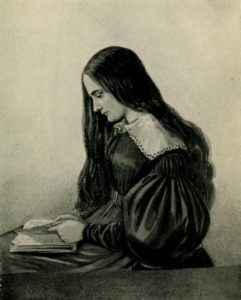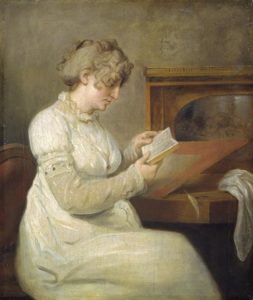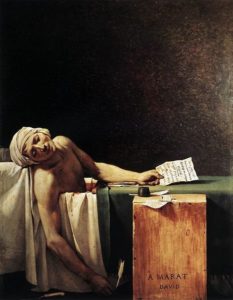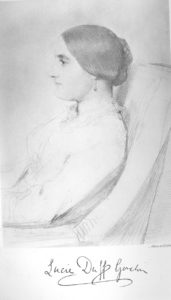
A man who murdered his lover on his wedding day. A serial killer who lured girls into his house with the promise to show them their future husbands in a magic looking glass. The first intentional use of a dog to search for a cadaver. Lady Lucie Duff Gordon (1821–1869) translated these stories from German to English and published them in 1846. Her anthology, Narratives of Remarkable of Criminal Trials, includes fourteen stories and her own preface.
And that might make her the first female true crime author in the English language.

Engel Christine Westphalen: First female true crime writer in the world
Across the North Sea in Germany, another woman author helped carry the true crime torch. In fact, Engel Christine Westphalen (1758-1840) might have been Lucie Duff Gordon’s role model. Westphalen was probably the first female true crime writer anywhere. She competed in the genre against the famous German poet, Friedrich Schiller, whom scholars today consider a father of modern true crime.
Westphalen, however, raised Goethe’s ire. Johann Wolfgang Goethe (Faust, Sorcerer’s Apprentice, Erlking), a vanguard of Weimar classicism, had laid down some rules for German literature: Fiction was an acceptable topic for female authors, but not true crime. Goethe assigned true crime to the genre of historical tragedy, a male-only genre.
Westphalen broke the rules by publishing a tragedy in 1804 about Charlotte Corday, the murderer of Jean Paul Marat in the French Revolution. When Goethe found out she wrote it, he erupted and took a shot at her underwear. “The worthy author of this tragedy of Charlotte Corday would have better spent her time knitting a warm underskirt for the winter than meddling this drama,” he said. Westphalen ignored Goethe and later won an award for her writing. You can read more about Westphalen and her Corday tragedy here.

Brief history of the true crime genre
The true crime genre has French and German origins. Friedrich Schiller (Ode to Joy, William Tell) helped launch true crime as a modern genre. Although he wasn’t the first author to write about crime, crime stories before his time were simple moralistic tales designed to scare the reader from treading from the path of righteousness. Schiller offered something new. Schiller and his French counterpart Gayot de Pitaval offered a psychological analysis of the criminal and focused on the motive. That’s the demarcation that separates modern true crime from the old-fashioned, moralistic crime tales. For that reason, scholars consider Schiller a father of the modern true crime genre.

True crime genre in the English language
If you define the true crime genre as a psychological analysis of the offender and his or her motives, the jump from French and German to English came later. Plenty of crime stories appeared in the English literature before Schiller and Pitaval worked their changes, but they appeared in the old-fashioned form of moralistic stories in pamphlets, the penny press, and ballads. Perhaps due to Schiller’s influence, respectable English authors began taking an increasing interest in crime tales. Thomas De Quincy published the satirical Murder Considered as One of the Fine Arts in 1827, Charles Dickens A Visit to Newgate in 1836, and William Thackeray Going to See a Man Hanged in 1840.
I can’t, however, find another female author among them, either in the modern form of the genre or in the older, moralistic one. For that reason, I propose Lucie Duff Gordon as a candidate for the first female true crime author in the English language.

Lucie Duff Gordon
Lucie Duff Gordon (1821–1869) was the only child of John Austin, a professor of jurisprudence at the University of London, and Sarah Austin, a German to English translator. In 1827, Lucie’s family moved to Germany so her father could study the German literature on jurisprudence. She attended a German school and became fluent in the language. It’s quite possible she became acquainted with Engel Christine Westphalen’s works in Germany.
Lucie became an avid reader, and following her return to England, she always read books with an eye towards the possibility of translating them. In 1840, she married Sir Alexander Cornwall Duff Gordon. Around the same time, Lucie Duff Gordon started publishing her first translations. Her fourth translation was the Narrative of Remarkable Criminal Trials.
Narrative of Remarkable Criminal Trials
The Narrative was Lucie Duff Gordon’s anthology of crime stories from the Bavarian judge and legislator, Paul Anselm Ritter von Feuerbach. Feuerbach spearheaded the legislative reform to repeal Bavaria’s version of the Constitutio Criminalis Carolina, a 300-year-old criminal code of the Holy Roman Empire. Bavaria passed Feuerbach’s new criminal code in 1813. Much of Germany later followed suit, basing their new codes on Feuerbach’s reform.
In her preface, Lucie Duff Gordon praised Germany’s criminal justice system. She suggested that Bavaria’s slow and thorough approach to trials resulted in lower rate of false convictions of innocent men than in England. The English, she suggested, would be wise to look across to the continent and learn something from the Bavarians.
Lucie Duff Gordon went on to write and publish her own works. Her most famous were Letters from Egypt (1865) and Last Letters from Egypt (1875).
Do you know of any female true crime authors in the English language prior to 1846? Knowledge is a cooperative effort, and perhaps a reader knows of another author.
Literature on point
Pamela Burger, “The Bloody Origins of the True Crime Genre,” JSTOR Daily (August 24, 2016).
P.J.A. Feuerbach, Aktenmäßige Darstellung merkwürdiger Verbrechen, (Giessen: Heyer, 1828).
Lady Duff Gordon, Narrative of Remarkable Criminal Trials (New York: Harper & Brothers, 1846).
Gail K. Hart, Freidrich Schiller: Crime, Aesthetics, and the Poetics of Punishment (Newark: University of Delaware Press 2005)
Jeffrey L. High, Schiller’s Literary Prose Works: New Translations and Critical Essays (Rochester, New York: Camden House 2008)
Stephanie Hilger, “The Murderess on Stage: Christine Westphalen’s Charlotte Corday (1804),” in Women and Death 3: Women’s Representations of Death in German Culture since 1500 (Clare Bielby & Anna Richards, eds.) (Rochester, NY: Camden House 2010) 71-87.
U.S. National Library of Medicine, “Most Horrible and Shocking Murders: True Crime Murder Pamphlets” (2010).
Gordon Waterfield, Lucie Duff Gordon in England, South Africa and Egypt (E.P. Dutton & Company, 1937).



